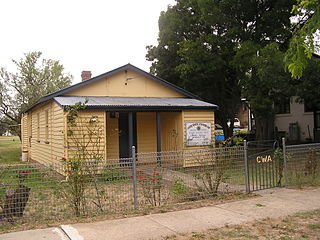The Australian Esperanto Association (AEA) is a national Esperanto association of Australia. It is affiliated with the Universal Esperanto Association.
The Australian Esperanto Association (AEA) is a national Esperanto association of Australia. It is affiliated with the Universal Esperanto Association.
The Australian Esperanto Association was formed in October 1911, during the first Australian congress, attended by 53 Esperantists. In 1976 AEA hosted the first Pacific Congress of Esperanto, in Melbourne. This was attended by 190 people, 51 from overseas. In 1988 it hosted the 4th Pacific Congress in Brisbane, with 204 attending, 76 from overseas.
In 1997 the 82nd world congress of Esperanto was held in Adelaide. Approximately one thousand Esperantists from 54 countries came to the congress, 820 of them from overseas.
AEA is affiliated with the Universal Esperanto Association (UEA), the International Esperantist Teachers League (ILEI) and with state and city Esperanto organisations, including the Esperanto Federation of New South Wales, Esperanto South Australia and Melbourne Esperanto Association.
AEA publishes in its website a list of local Esperanto clubs and organisations in Australia. Local Esperanto groups exist in Sydney, Melbourne, Adelaide, Brisbane, Hobart, Perth, Canberra, Toowoomba (Qld), Manly (NSW), Newcastle (NSW), Torquay (Vic), and Central Coast (NSW).
AEA holds a national congress and summer school each year, usually in January, with lectures, workshops, artistic presentations, excursions and classes in the language for beginners and intermediate-level speakers. In March 2016, AEA and the Esperanto associations of Indonesia and New Zealand held a three-nation congress in Bandung, Indonesia, the site of the historic Asia-Africa Conference of 1955. The second three-nation congress was held in Bekasi, Indonesia, in March 2018.
The official journal of the Australian Esperanto Association and the New Zealand Esperanto Association is “Esperanto sub la Suda Kruco” (Esperanto Beneath the Southern Cross) (ESK). ESK is available both in printed as well as electronic (pdf) format, and is sent out quarterly to every member of both associations.
Esperanto-TV is a high-quality Internet Protocol Television (IPTV) service, based in Sydney, which broadcasts content worldwide exclusively in Esperanto. It can be viewed on computer, Android smartphone, iPhone, iPad and (in the US, Canada, UK and Ireland) on “traditional television” (via Roku Streaming Player). Esperanto-TV is supported by the Australian Esperanto Association.
A program of news, interviews and songs in Esperanto is broadcast for one hour every Monday at 1pm by Melbourne ethnic community radio 3ZZZ, on 92.3 FM. Programs are also available as podcasts on the Melbourne Esperanto Association website.
AEA administers an official examination system, intended to officially test and certify linguistic proficiency in Esperanto. The system is composed of 3 separate tests: Elementa (basic), Supera (intermediate) and Klereca (advanced). Successful completion of one of these tests is sometimes a pre-requisite to receiving scholarships, or entering specific courses.
The official examinations of AEA are made available to all during the annual Congress and Summer School, as well as throughout the year through specially appointed representatives in various local Esperanto organisations throughout the country. The entire examination system is overseen by the AEA Chief Examiner - currently Trevor Steele, a renowned Esperanto author, and member of the Academy of Esperanto.

L. L. Zamenhof developed Esperanto in the 1870s and '80s. Unua Libro, the first print discussion of the language, appeared in 1887. The number of Esperanto speakers have increased gradually since then, without much support from governments and international organizations. Its use has, in some instances, been outlawed or otherwise suppressed.

The Universal Esperanto Association, also known as the World Esperanto Association, is the largest international organization of Esperanto speakers, with 5501 individual members in 121 countries and 9215 through national associations and in official relations with the United Nations. In addition to individual members, 70 national Esperanto organizations are affiliated with UEA. Its current president is the professor Duncan Charters. The magazine Esperanto is the main organ used by UEA to inform its members about everything happening in the Esperanto community.

As early as 1929, two Melbourne commercial radio stations, 3UZ and 3DB were conducting experimental mechanical television broadcasts - these were conducted in the early hours of the morning, after the stations had officially closed down. In 1934 Dr Val McDowall at amateur station 4CM Brisbane conducted experiments in electronic television.

Television in Australia began experimentally as early as 1929 in Melbourne with radio stations 3DB and 3UZ, and 2UE in Sydney, using the Radiovision system by Gilbert Miles and Donald McDonald, and later from other locations, such as Brisbane in 1934.

The Melbourne Cricket Club (MCC) is a sports club based in Melbourne, Australia. It was founded in 1838 and is one of the oldest sports clubs in Australia.

Intercolonial cricket matches were the first-class cricket matches played between the various colonies of Australia prior to federation in 1901. After federation, they became known as Interstate matches. By the 1880s regular intercolonials were being played, generally with intense rivalry. Matches against visiting professional teams from England also attracted public interest.
Lacrosse in Australia is a minor sport, with a long and proud history dating back to 1876, with a small but dedicated community of participants and volunteers. The established centres for Lacrosse are in the greater metropolitan areas of Melbourne, Adelaide, and Perth. In these cities there are organised weekend field lacrosse competitions for men and women at senior and junior levels, played over the winter months. In the off-season, there are informal box lacrosse and sofcrosse competitions, though the majority of players in Australia are mostly of the field lacrosse type. Some lacrosse is also played in Sydney, Newcastle, South East Queensland, Canberra and Hobart, it is very much at the developmental level.

The Country Women's Association of Australia is the largest women's organisation in Australia. It has 44,000 members across 1855 branches. Its aims are to improve the conditions for country women and children and to try to make life better for women and their families, especially those women living in rural and remote Australia. The organisation is self-funded, nonpartisan and nonsectarian.

The Australian Council for Educational Research (ACER), established in 1930, is an independent educational research organisation based in Camberwell, Victoria (Melbourne) and with offices in Adelaide, Brisbane, Dubai, Jakarta, Kuala Lumpur, London, New Delhi, Perth and Sydney. ACER develops and manages a range of testing and assessment services and conducts research and analysis in the education sector.

This timeline of Australian television lists important station launches, programs, major television events, and technological advancements that have significantly changed the forms of broadcasting available to viewers of television in Australia. The history of television in Australia can be traced back to an announcement from the Menzies' government concerning plans for television services in Sydney and Melbourne.

7HD is an Australian television channel, owned by Seven West Media, originally launched on 15 October 2007 featuring unique breakaway programming from 10 December 2007 to 4 October 2009 and a HD simulcast of Seven until 25 September 2010. The channel is available to high definition digital television viewers in metropolitan areas through a number of owned-and-operated stations. On 25 September 2010, 7HD was replaced by the new channel 7mate.

ABC Radio and Regional Content is the division of the Australian Broadcasting Corporation responsible for radio output and regional content.
The Overseas Telecommunications Veterans Association was founded in Sydney, Australia in 1956 by long-serving employees and ex-employees of Amalgamated Wireless Australasia Limited (AWA), Cable & Wireless and Australia's then international telecommunications carrier, the Overseas Telecommunications Commission (OTC), which had itself been established a decade earlier by combining the international radio and cable assets of AWA and C&W respectively.
Football Superstar is an Australian reality television series that aired on FOX8. It was hosted by Lee Furlong and Brian McFadden, with Kris Smith replacing McFadden in the third season. The show aimed to find a new football (soccer) star from male contestants aged 16 to 21. In its three seasons, the winners were Adam Hett, Luke Pilkington and Liam McCormick.
The New Zealand Esperanto Association is the national Esperanto association of New Zealand. It is an incorporated society and affiliated with the Universal Esperanto Association.

The World Esperantist Vegetarian Association is a voluntary association of Esperanto-speaking vegetarians. Founded in 1908, the group's working language is Esperanto, and it is the oldest international organization of vegetarians that is currently active. TEVA published a journal, Vegetarano ("Vegetarian") from 1914 to 1932, revived in 2009 as Esperantista Vegetarano, and has also operated a spirited Internet mailing list through Yahoo! Groups since 2005.
The Australian Medical Students' Association (AMSA) is an independent association of the 17,000 medical students in Australia. AMSA was formed in 1960 in Brisbane, as a conference organised to network medical students from Australia. It has since grown to become the peak representative body for Australia's medical students—serving a mandate to connect, inform and represent medical students in Australia. Its tri-annual Council meetings include representatives from medical societies at each of Australia's 23 medical schools.
The practice of Historical European Martial Arts (HEMA) first started in Australia in the late 19th century before largely dying out. There was then a revival of interest in the late 20th century to the current day. The practice of HEMA in Australia has grown to be a popular activity, with clubs all in capital cities, and the larger cities in Australia, Sydney and Melbourne, each have a number of clubs teaching various styles.

The following outline is provided as an overview of and topical guide to Esperanto: